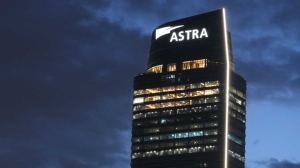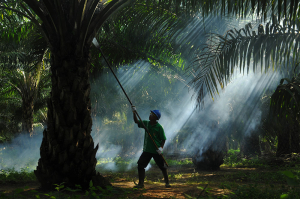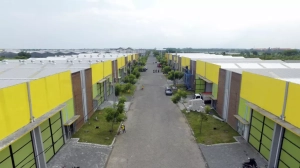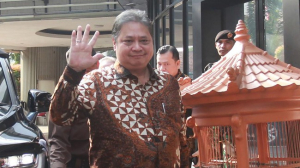10 largest oil palm plantations in Indonesia
Indonesia is the world’s largest producer of palm oil, producing around 46.2 million metric tons in 2021 alone. Being the largest producer, consequently Indonesia has the largest oil palm plantations, especially in Sumatra and Kalimantan islands.
According to Sawit Watch - an NGO focuses on policy reforms to protect high conservation forest and the community from oil palm plantations expansion - the total area of oil palm plantations reached 22.3 million hectares (ha) in 2020, 30% of which are owned by farmers. In the same year, the total export value for palm oil in October 2020 reached US$ 15.95 billion or IDR 225.37 trillion, according to the Ministry of Trade.
Until now, oil palm plantations are expanding to the eastern part of Indonesia, and require approximately 12 million hectares of energy plantations to meet 50 million tons of Crude Palm Oil (CPO). With a high production volume, Indonesia will likely not need to import palm oil within the next 15 years.
However, its irresponsible palm oil production has caused widespread rainforest destruction and wildlife loss, exacerbated climate change and impacted the rights of local communities, according to environmental group WWF.
Who are behind the country’s massive oil palm plantations?
PT Triputra Agro Persada (TAPG)
PT Triputra Agro Persada (TAPG) was established in 2005. It focuses on processing palm oil through its subsidiaries and associated companies as well as rubber plantations. In recent efforts, the company has invested in expanding its business activities in other plantation companies such as investments, joint ventures and company acquisitions.
TAPG has committed to produce high-quality CPOs and palm kernel products to supply domestic and international markets. Its products are based on green plantations to contribute positively to the world economy and social environment.
The company has committed to comply with the government regulations in following standards and certifications to be recognized nationally and internationally through Indonesian Sustainable Palm Oil (ISPO) and Roundtable on Sustainable Palm Oil (RSPO). Currently, the company's palm oil mills have been certified according to the Company Performance Rating Program in Environmental Management (PROPER) by the government.
- Total plantations area: 158,000 ha.
- Palm oil mills:
- Jambi: 1 palm oil plantation, 1 palm oil mill, 1 rubber plantation and 1 smoked rubber processor.
- Central Kalimantan: 11 palm oil plantations and 9 palm oil mills.
- East Kalimantan: 12 palm oil plantations and 8 palm oil mills.
- Owner: Theodore “Teddy” Rachmat
- Rachmat is a CPO billionaire that ranked 15th as the richest man in Forbes in 2021 with a wealth reaching US$ 3.4 billion or IDR 49.1 trillion in 2022.
- Rachmat studied Mechanical Engineering and graduated in 1968 from the Bandung Institute of Technology (ITB). Later in the same year, he started his career in PT Astra International Tbk. He has built his career to become a senior and executive positions and was appointed President Director, President Commissioner and then Commissioner of PT Astra International Tbk until 2005.
- In 1998, Rachmat founded PT Triputra Investindo Arya along with the late Subianto. He is currently the President and Director of the company. One of his subsidiaries is PT Triputra Agro Persada Tbk.
- Shareholders:
- PT Persada Capital Investama at 23.24%;
- PT Triputra Investindo Arya at 22.93%;
- Salween Investment Pte. Ltd. at 14.90%;
- PT Daya Adicipta Mustika at 14.01%;
- Gochean Holding Incorporated with 10.90%;
- Public with 14.02%
PT Eagle High Plantations Tbk
PT Eagle High Plantations Tbk is a dynamic plantation with a high reputation in economy and social environment. The company was established in 2000, with the original name PT Bumi Perdana Prima Internasional. The name was changed to PT BW Plantation Tbk in 2007. In 2019, the company was listed at the Indonesia Stock Exchange with the code BWPT. Since 2014, the company had been acquired by Green Eagle Group with 100% in shares and rebranded as PT Eagle High Plantations Tbk.
The company has committed to be a sustainable company that foresees stable economic, environmental, social and good corporate governance.
- Total plantation area: over 116,000 ha in Sumatra, Kalimantan and Papua.
- Owner: Rajawali Property Group (Peter Sondakh).
- Sondakh is ranked 20th as the richest person by Forbes in 2021. His wealth exceeds US$ 2 billion or IDR 28.9 trillion in 2022.
- Shareholders:
- PT Rajawali Capital International at 37.7%;
- FIC Properties Sdn Bhd at 37%;
- Public at 25.3%.
First Resources Ltd
First Resources Ltd was established in 1992. The company's activities include cultivating palm oils, harvesting fresh fruit bunches (FFB), milling crude palm oil (CPO) and palm kernel (PK). Additionally, the plantation includes oil mills with a refinery, fractionation, biodiesel and kernel-crushing plants. The company processes the CPO into biodiesel, refined, bleached and deodorized (RBD) olein, RBD stearin, palm kernel oil and palm kernel expeller. The company sold the products both locally and internationally.
First Resources' production from FFB in 2021 reached 17.2 tons. It also produced 869,241 tons of CPO in 2021 alone with an extraction rate of 22.7% and a PK extraction of 5.2%.
In 2022, the company has two processing plants in Pelintung and Dumai sea-front Integrated Processing Complex (IPC) in Riau Province. The commissioning of a refinery, fractionation and biodiesel plant started in 2010, maximizing the company's upstream plantation. Annually, the company is able to process about 850,000 tons of capacity.
- Total plantation area: over 200,000 ha in Riau, East Kalimantan and West Kalimantan.
- Owner: Ciliandra Fangiano.
- Fangiono is the second generation of First Resources. In 2014, Fangiono was listed as the 22nd richest in Indonesia and the youngest richest man in 2022. In 2021, Fangiono became the 50th richest man in Indonesia. His wealth exceeds US$ 1.83 billion or IDR 26.4 trillion.
- Shareholders (as of March 2022):
- Eight Capital Inc. with 66.2%;
- FMR LLC with 8%;
- Infinite Capital Fund Ltd with 5.6%;
- Free Float with 20.2% shares.
Asian Agri dan Apical
Asian Agri is a private company that produces palm oil through sustainable means. Established in 1979, the company becomes one of the largest palm oil producers in Asia. It produces sustainable crude palm oil and crude palm oil kernels with advanced technology and energy self-sufficient mills. Its power plants are powered by biogas converting leftover organic material from the oil palm process to renewable energy. It currently has 30 plantations and 22 palm oil mills that are certified with International Sustainability & Carbon Certification (ISCC). It produces about 1 million metric tons (Mt) each year of crude palm oil (CPO) at 22 mills. Asian Agri is a subsidiary of Royal Golden Eagle Group (RGEI), known previously as Raja Garuda Mas.
Apical Group Ltd. is a leading vegetable oil processor. It was established in 2006. The company has 8 refineries, 4 renewable fuel plants, 3 kernel crushing plants, 5 oleochemical plants and a capacity of 4.2 million tons per year. In 2016, it acquired the Spanish company Bio-Oil, which then resulted in the increase of its production capacity to over 680,000 tons per year in diesel fuel or a 60% increase. Its products are exported to over 50 markets worldwide.
- Total plantation area (in North Sumatra; Riau; Jambi):
- 100,000 ha across 30 plantations
- 60,000 ha plantations managed by smallholders
- 41,500 ha by independent smallholders
- Owner: Sukanto Tanato
- Tanato is Indonesia's 21st richest man, according to Forbes in 2021. His wealth was around US$ 1.9 billion or IDR 27.4 trillion. He started his business in 1967 in the construction and oil industry.
Indofood Agri Resources Ltd
Indofood Agri Resources Ltd or IndoAgri is a vertically integrated agribusiness model that supplies oil, palm seed breeding, oil palm cultivation, milling and refining. It owns strategic production facilities that occupy 300,749 ha and is located in Sumatra and Kalimantan. The company is present in Indonesia and Brazil. It has refineries in major cities such as Jakarta, Medan, Surabaya and Bitung.
- Total plantation area:
- Nucleus oil palm plantations of about 250,615 ha
- Plasma of about 86,970 ha.
- Owner: Anthony Salim.
- Salim is ranked 3rd as the richest man according to Forbes in 2021, with a wealth reaching US$ 8.5 billion or IDR 122.7 trillion. Salim (Chinese name: Liem Hong Sien) was born in 1949. He is the son of tycoon Sudono Salim, a close confidant of former authoritarian Soeharto. Salim family owns a palm oil business namely through Indofood Agri Resources Ltd.
- Salim Group owns palm oil companies such as:
- PT Perusahaan Perkebunan London Sumatra Indonesia Tbk (LSIP);
- PT Salim Ivomas Pratama Tbk (SIMP).
- Shareholders:
- UOB Kay Hian Private Ltd at 73.08%;
- CGS-CIMB Securities (Singapore) Pte. Ltd. at 9.35%;
- Citibank Nominees Singapore Pte. Ltd. at 2.22%;
- HSBC (Singapore) Nominees Pte. Ltd. 1.56%;
- OCBC Securities Private Ltd. 1.48%.
Wilmar International Ltd
Wilmar International Ltd. was founded in 1991. It focuses on the cultivation and milling of palm oil and sugarcane, processing, branding and distribution of edible food products from bulking, animal feeds and agri products such as oleochemicals and biodiesel. The company has 500 manufacturing plants and extensive distribution covering China, India, Indonesia and 50 other countries and regions. It also engages in sustainability in its operations, supply chain and communities.
- Owner: Martua Sitorus
- Sitorus is ranked 14th as the richest person in Indonesia by Forbes in 2021, and currently possesses a wealth worth US$ 2.7 billion or IDR 39 trillion.
PT Sinar Mas Agro Resources & Technology Tbk (SMART)
SMART is one of the most advanced agribusinesses in the world. It was established in 1962 and is a subsidiary of Golden Agri-Resources (GAR), which operates under Sinar Mas Agribusiness. The company sits at the front in the field of agronomy and technology. Its downstream is able to produce high quality and supply the international market in agronomy, food security, oleochemical and bio-energy.
The company's factories produce 4.35 million tons of fresh fruit bunch per year, its processing kernel crushing plant at 810,000 tpa (tons per annum), oleochemical factory at 240,000 tpa, refinery at 2.88 million tpa, biodiesel factory at 600,000 tpa.
- Total plantation area: 137,000 ha.
- Owner: [Eka Tjipta] Widjaja family
- The family ranks 2nd as the richest in Indonesia according to Forbes in 2021, with its wealth reaching US$ 9.7 billion or IDR 140 trillion.
Musim Mas Group
Musim Mas Group is the biggest integrated palm oil company in the world in over 13 countries. It was established in 1972. Its main operations are located in Indonesia, which includes refinery and manufacturing. In 2004, the company joined the Roundtable on Sustainable Palm Oil (RSPO) and received certifications for all of its plantations by 2012. In 2019, it is the first palm oil plantation company to receive the Palm Oil Innovation Group (POIG).
Its activity includes:
- Managing oil palm plantations to produce tbs;
- Processing palm fruit to produce Crude Palm Oil (CPO) and Palm Kernel (PK);
- Crushing/grinding PK to get Crude Palm Kernel Oil (PKO);
- CPO and PKO refinery;
- Further processing to produce value-added products such as Specialty Fats, Oleochemicals, Biodiesel, Soap, Palm Wax;
- Functional products such as Emulsifiers; and
- Producing consumer goods, such as cooking oil and personal care products.
- Owner: Bachtiar Karim
- Karim is the 10th richest man by Forbes in 2021. His wealth exceeds US$ 3.5 billion or IDR 50.5 trillion. Together with his siblings Burhan and Bahari, they run Musim Mas as the biggest palm oil company in Indonesia. In 2020 alone, the sales of palm oil reached US$ 6.9 billion.
MAKIN Group
Makin Group/PT Matahari Kahuripan Indonesia (MAKIN) business spread in Jambi and Central Kalimantan.
- Owner: Susilo Wonowidjojo
- Wonowidjojo ranks 7th in Forbes 2021. His current wealth exceeds US$ 4.8 billion or IDR 69.3 trillion. He started his career in cigarette company PT Gudang Garam and then ventured into the palm oil industry.
PT Sampoerna Agro Tbk (SGRO)
PT Sampoerna Agro Tbk (SGRO) was established in 1993 under the name PT Selapan Jaya and changed its name in 2007 to PT Sampoerna Agro Tbk. The company, which was listed in 2007, along with its subsidiaries is an integrated and diversified plantation company with a sustainable long-term commitment. It engages in palm oil production, superior oil palm seeds, and non-palm products including sago or prima starch and rubber. Palm oil constitutes 94% of the company's revenue in 2021 from CPO and palm kernel.
- Total plantation area:
- 100,000 ha of oil palm plantations in West Kalimantan, Central Kalimantan and South Sumatra.
- Owner: Putera Sampoerna
- Sampoerna is the 25th richest man by Forbes in 2021. His wealth exceeds US$ 1.8 billion or IDR 26 trillion. He sold the family’s cigarette company PT HM Sampoerna Tbk in 2005 to Phillip Morris. Sampoerna then focuses his business on finance, property, telecommunications, carpentry and plantations.
- Shareholders:
- Sampoerna Agri Resources Pte., Ltd. at 69.68%;
- Public at 30.32%.
Arsari Group
Arsari Group was established in 2013. The company focuses on palm oil, mining, pulp and paper, and logistics and cargo.
- Owner: Hashim Djojohadikusumo
- Djojohadikusumo is the brother of Minister of Defense, Prabowo Subianto. He is ranked 40th as the richest man by Forbes in 2021. His wealth exceeds US$ 685 million or IDR 9.9 trillion.
Problems in oil palm plantations
According to Sawit Watch in 2021, the actual condition of the palm oil industry and its oil palm plantations is inversely proportional to what the management of the oil palm company has reported.
The palm oil industry as a whole operates unsustainably. It means both from an ecological and social point of view, it has a very bad impact. Their operating models are considered very negative to the environment, such as looting of natural resources, large-scale monoculture cultivation and destroying biodiversity as well as the extensive use of herbicides, pesticides and chemical fertilizers.
Many environmental problems caused by oil palm plantations have a direct impact on local residents living in plantation areas. For example, communities suffer from river pollution, land degradation and displacement of their homes. In 2020, Sawit Watch also stated there were 1,061 communities that were in conflict with large palm oil plantations.
The International Council of Clean Transportation (ICCT) revealed that new palm oil plantations often replaced forests in Indonesia, including carbon-rich peatland that was home to the native orangutan. More than 60% of Indonesian rainforest species are endemic to that region-iconic species such as the orangutan, which are replaced with rats and other pests when native forest is converted to oil palm plantations. Deforestation drives climate change through the release of carbon when trees and other plants are cut down. In particular, the drainage of peat soils in Indonesia for palm oil establishment is associated with massive greenhouse gas emissions.
Already have an account? Sign In
-
Start reading
Freemium
-
Monthly Subscription
20% OFF$29.75
$37.19/MonthCancel anytime
This offer is open to all new subscribers!
Subscribe now -
Yearly Subscription
33% OFF$228.13
$340.5/YearCancel anytime
This offer is open to all new subscribers!
Subscribe now







